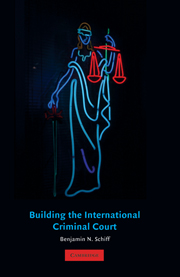Book contents
- Frontmatter
- Contents
- Preface
- Acronyms
- Building the International Criminal Court
- Introduction
- 1 River of Justice
- 2 Learning from the Yugoslavia and Rwanda Tribunals
- 3 The Statute – Justice versus Sovereignty
- 4 Building the Court
- 5 NGOs – Advocates, Assets, Critics, and Goads
- 6 ICC–State Relations
- 7 The First Situations
- 8 Conclusions: The Politics of the International Criminal Court
- Web Sites for Further and Ongoing Information
- Bibliography and Sources
- Index
Introduction
Published online by Cambridge University Press: 05 September 2012
- Frontmatter
- Contents
- Preface
- Acronyms
- Building the International Criminal Court
- Introduction
- 1 River of Justice
- 2 Learning from the Yugoslavia and Rwanda Tribunals
- 3 The Statute – Justice versus Sovereignty
- 4 Building the Court
- 5 NGOs – Advocates, Assets, Critics, and Goads
- 6 ICC–State Relations
- 7 The First Situations
- 8 Conclusions: The Politics of the International Criminal Court
- Web Sites for Further and Ongoing Information
- Bibliography and Sources
- Index
Summary
The International Criminal Court (ICC) soars with the loftiest of ideals as it grapples with the basest of human acts. This first and only permanent international criminal court intends to counter impunity by prosecuting perpetrators of genocide, crimes against humanity, and war crimes. It seeks to deter depredations against citizens in violent conflicts and to contribute to justice, peace, political transition, and reconstruction.
Ideally, domestic societies use legitimate political processes to devise and promulgate their laws. Then the laws are fairly implemented by legal systems that remove the politics from justice. This ideal is often compromised by extralegal influences, by biased legal structures, and by maladministration; nonetheless, the ideal is a widely accepted model of an objective, dispassionate, truth-based mechanism for upholding society's rules.
If this model represents a goal toward which societies strive with only partial success, international law is even more tenuous. International law is based on an ephemeral society that lacks a legislative structure, and it seeks to constrain sovereign states that recognize no consolidated authority for enforcement. International organizations operate at the sufferance of states, subject to their desires, dependent upon their generosity, and victims of their ploys. Moreover, international organizations are subject to the same weaknesses as domestic ones – outside influences, bias, and maladministration. Nonetheless, since the beginnings of the modern state system, advocates of law have tried to extend to the international level the logic and structures familiar in the domestic context. International law has proliferated.
- Type
- Chapter
- Information
- Building the International Criminal Court , pp. 1 - 13Publisher: Cambridge University PressPrint publication year: 2008

